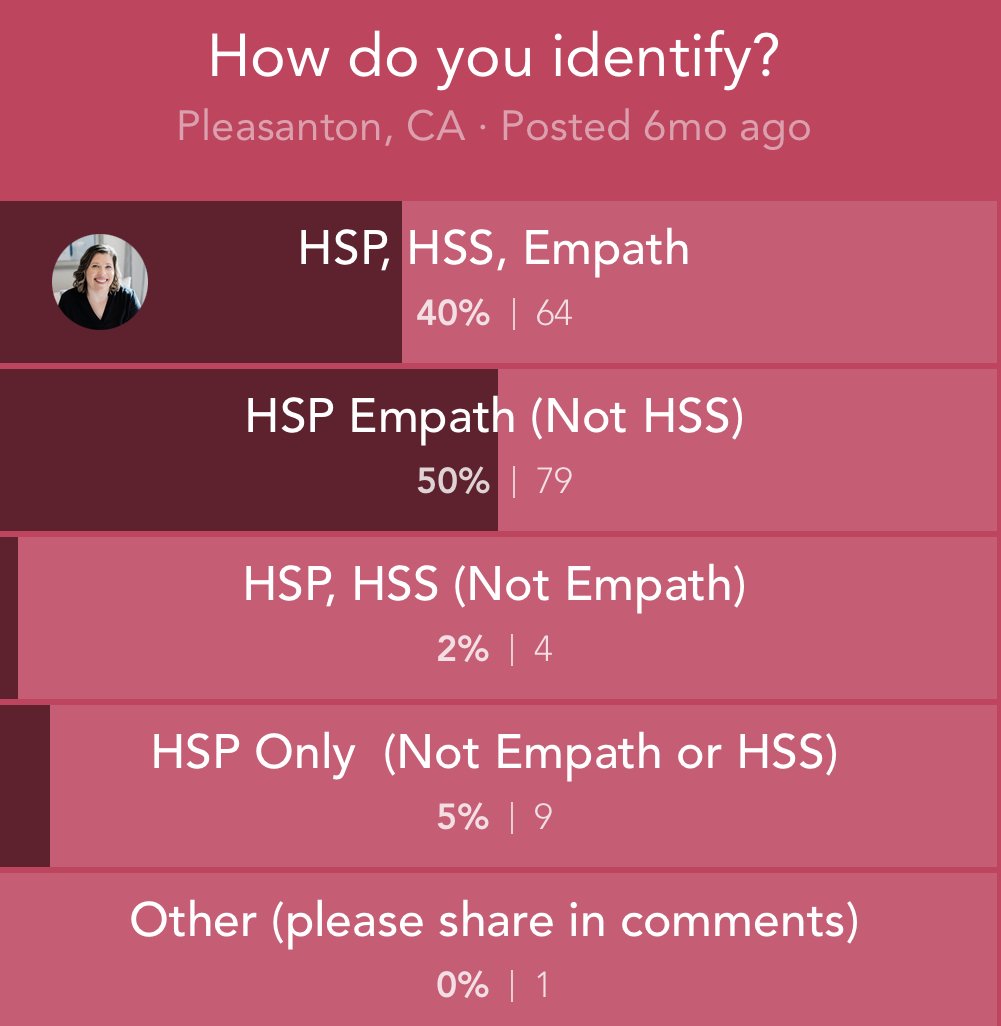Do You Identify as an HSP Empath?

This was a poll we did in my Sensitive Empowerment Community and most of us identify as HSP Empaths! Do you?
Sensitivity is on a spectrum and those of us that score at the highest level are considered HSP Empaths. Are you an HSP Empath too?
HSS stands for high sensations seeking.
Learn more here and listen to our episode about the trait some HSPs have too!
Explore more interesting polls, daily discussions, join live events and make kind-hearted HSP friends in this supportive, positive, inclusive, conscious HSP community.
Julie Bjelland is a psychotherapist specializing in high sensitivity, founder of Sensitive Empowerment, Author of The Empowered Highly Sensitive Person, and host of The HSP Podcast. She’s regularly featured in international podcasts, articles, and as an expert speaker. Her books, blog, online courses, free Masterclasses, and Sensitive Empowerment Community have helped thousands of highly sensitive people (HSPs) worldwide reduce their challenges, access their gifts, and discover their significant value to thrive to their fullest potential. Her HSPs in Business Group connects and supports HSPs, offers referrals, collaborations, networking, and free listings on her public HSP Practitioners directory, HSPs to Interview Directory, and HSPs in Business Directory. Julie loves mentoring and empowering sensitive people, especially women in heart-centered businesses. JulieBjelland.com ❤️🌈❤️ (she/her)
Learn how self-blame forms in sensitive and neurodivergent individuals—and how to begin healing with compassion and self-trust.
Emotional pain is real and valid. Learn how to support your sensitive nervous system with compassion and care during overwhelming moments.
Discover your money archetype & transform your relationship with money in this gentle, empowering workshop for sensitive and neurodivergent people.
When life feels heavy, negativity can take over. But one simple daily goal—intentionally noticing small moments of beauty, joy, or awe—can train your brain to focus on the positive. This easy practice helps balance emotions, improve mood, and build resilience. Try it for a week and experience the shift!
Many sensitive and neurodivergent individuals experience developmental trauma and CPTSD, yet these two forms of trauma are often misunderstood. Learn how early-life adversity and chronic trauma impact emotional regulation, identity, and relationships—and discover pathways to healing.
New research on the Sensitive Autistic Phenotype reveals key health and neurological patterns in autism. A recent survey highlights common conditions like gut issues, anxiety, sleep struggles, executive dysfunction, chronic pain, and medication sensitivity. These findings stress the need for neurodivergent-affirming healthcare. Read the full report to explore key trends.
Feeling overwhelmed? Glimmers—small moments of joy, peace, or connection—can help regulate your nervous system and bring light to dark times. In this blog, Julie Bjelland, LMFT, shares how sensitive and neurodivergent individuals can train their brains to notice these moments, ease emotional overwhelm, and build resilience.
Discover gentle, effective ways to soothe your nervous system during overwhelm. Learn calming techniques specifically tailored for sensitive and neurodivergent individuals.
Unmanaged sensory overload can lead to serious health risks for sensitive and neurodivergent individuals, including burnout, immune dysfunction, and heart complications. Learn how sensory overwhelm affects your nervous system, why chronic stress can impact your well-being, and how to protect your health with science-backed strategies.









Many sensitive adults are discovering they’re autistic after years of being misunderstood. Explore 25 traits that may reveal a deeper neurodivergent identity, especially if you’ve related to being “just sensitive.”